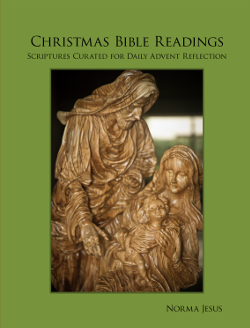 What would a gift given to Jesus this Christmas look like? Would it be gold, frankincense, and myrrh left at an altar? Probably not. Scripture does, however, make it pretty clear what God wants from us. And not just at Christmas.
What would a gift given to Jesus this Christmas look like? Would it be gold, frankincense, and myrrh left at an altar? Probably not. Scripture does, however, make it pretty clear what God wants from us. And not just at Christmas.
There is a lot of talk about gifts this final weekend before Christmas: who has or has not finished shopping, what bargains were found, is on line shopping better than the mall. Listening to all the chatter, one might think the only way to give a gift is with a purchased present. Perhaps this ritual of gift giving for Christmas was begun by people imitating the magi, the wise men who presented valuable gifts to Jesus sometime after his birth. But the magi’s were gifts given to Jesus; we “exchange” gifts with others, often motivated by a feeling of obligation rather than love or gratitude.
What would a gift given to Jesus this Christmas look like? Would it be gold, frankincense, and myrrh left at an altar? Probably not. Scripture does, however, make it pretty clear what God wants from us. And not just at Christmas.
Nevertheless, Christmas could be a good time to start to give to Him in a special, deliberate way. We could purpose to do something special for him even if we do try to give to him all year. In order to be a gift, this act would have to be done merely as an expression of love for God, not something done with the intention to win God’s favor.
Jesus told us to love God wholeheartedly and to love others as ourselves. Demonstrating our love for Him would be a gift to Him. If we consider the way we demonstrate love to people in our lives, we can more easily imagine how to demonstrate love for God, even though, of course, God is God so it’s not exactly the same. When we love someone, we typically show it by wanting to spend time with them, we are glad to tell other people why we think the one we love is so special, and we find ourselves being interested in what they are interested in.
With this idea of love in mind, we can find ways to spend time with God, to share with others why we think He is so special, to take an interest in what He is interested in.
We can spend time worshiping Him. We can think about who the Scriptures say He is and praise Him for it. We can thank Him for all He has done for us corporately and in our individual lives. When we sing traditional Christmas carols or hymns in these last days of Christmas, we can take time to contemplate the meaning of the lyrics, engaging our hearts and our minds.
We can bring Jesus into our Christmas traditions. For example, many people make it a point to watch a particular movie or movies each Christmas. If you have a favorite movie, discuss what you like about it and how it relates to the message of Christ.
It’s A Wonderful Life is a favorite for many families. The movie has an angel in it, but it’s not exactly a Biblical depiction. Why not discuss the biblical account of the angels’ part in the Christmas story. You could discuss how the positive messages in It’s A Wonderful Life relate to the gospel message.
If children are involved in your celebration, or even if they aren’t, picture books can be a wonderful way to revisit important principles. The Giving Tree, The Tale of Three Trees, The Gift of the Magi, and The Clown of God are classics among many good books that can be a great starting point for a discussion on sacrificial giving.
There are traditional ways of holiday giving that don’t involve gift buying: Christmas caroling, singing at convalescent homes, giving extra money to charitable organizations—these are all good acts, of course. And they are also good ways of sharing the Christmas message. But even in the home this Christmas and the last few days before, we can demonstrate our love for Jesus by loving others in ways He demonstrated to us. We can demonstrate patience and kindness and forgiveness. We can take time to listen to others and be interested in what they have to say, being especially mindful of the person at our Christmas celebration who may feel a little like an outsider.










